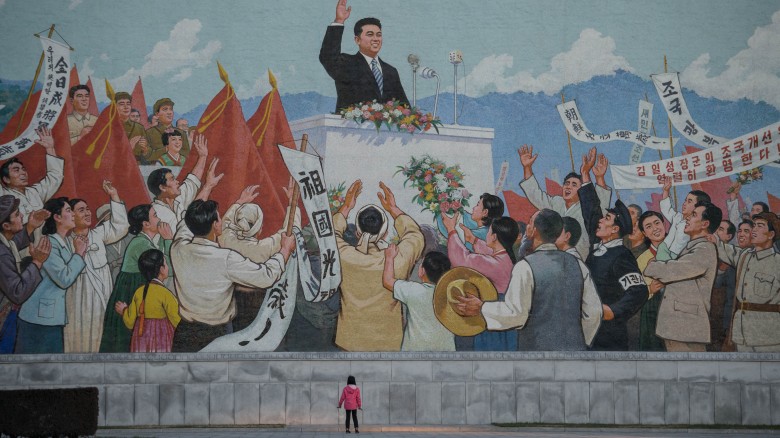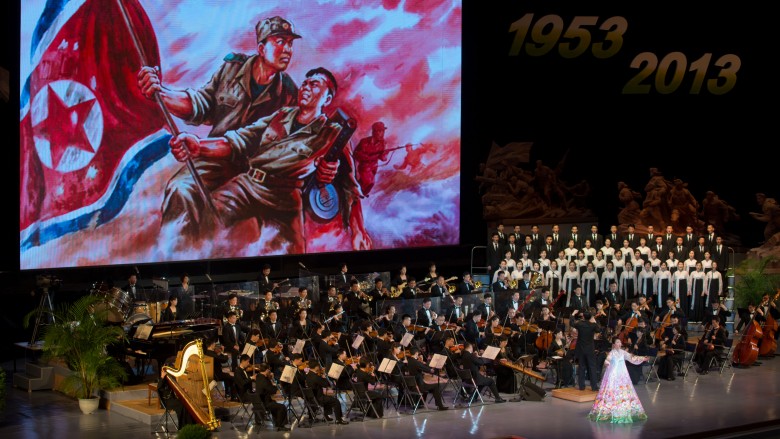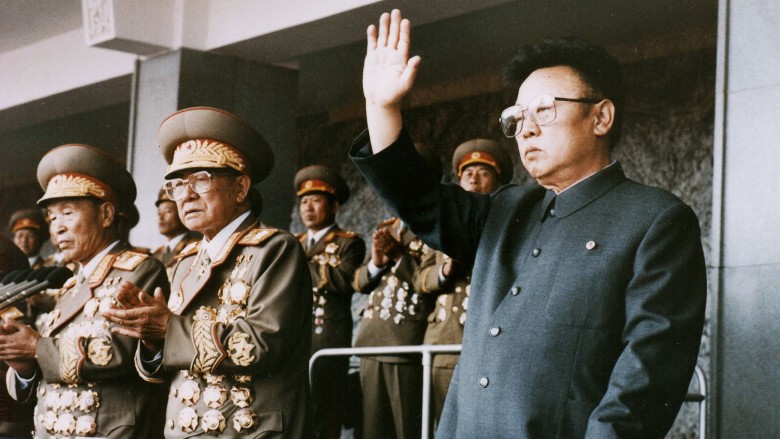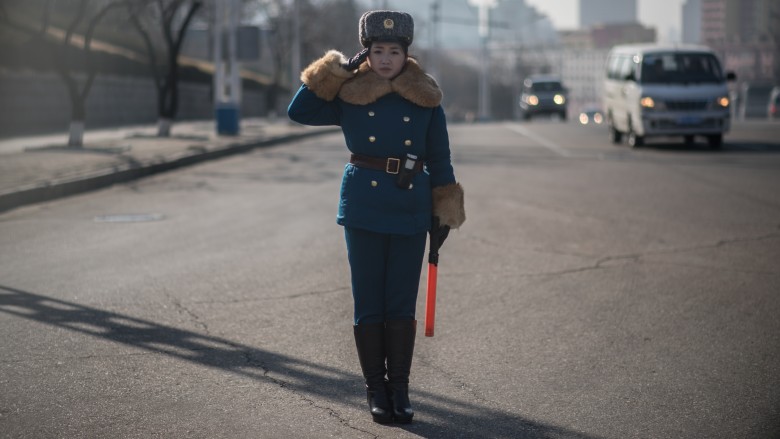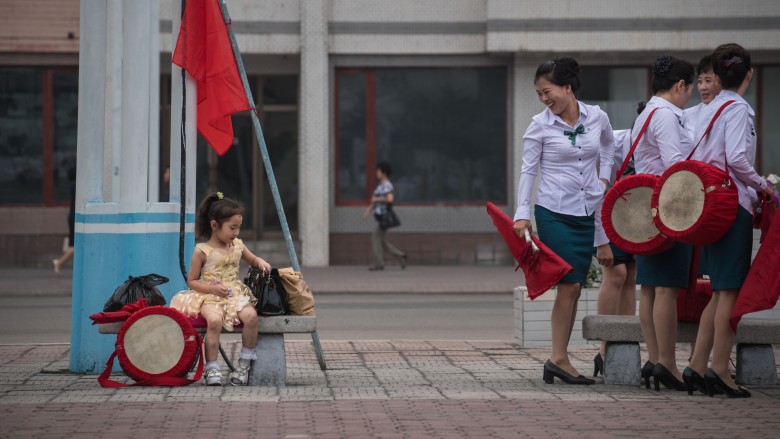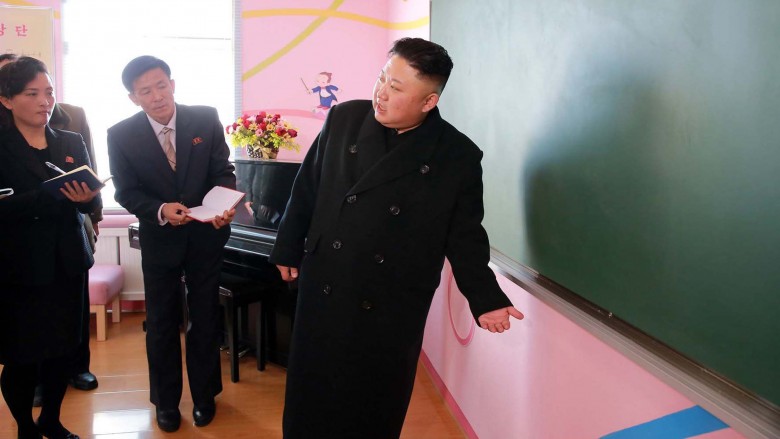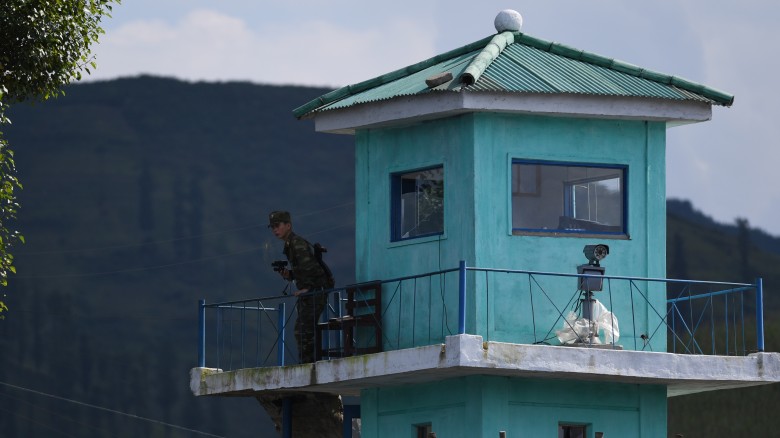What Life Is Really Like In North Korea
By all accounts, North Korea is a weird place. Everyone knows that. But just how weird is it?
Well, sad to say, life in North Korea goes way, way beyond simply weird. It's repressive, sad, and often deeply disturbing. From forced labor camps to propaganda to no Internet, life is truly torture in the world's most restrictive nation.
The propaganda is inescapable
In North Korea, the well-oiled propaganda machine is always working overtime, resulting in an environment in which brainwashing is inescapable.
In many ways, today's extreme propaganda in North Korea is heavily influenced by the deceased Kim Jong-il, former Dear Leader and father of current Supreme Leader Kim Jong-un. Kim Jong-il was an avid moviegoer and massive cinephile, who, according to Charlotte Burns, believed film was the "most powerful tool for educating the masses"—writing, in an essay called "Theory of Cinematic Art," that "it is cinema's duty to turn people into true communists." In fact, the Chairman of the Workers' Party of Korea loved film so much, he commissioned the construction of seven cinemas for his use only, proclaimed himself a genius of cinema, and kidnapped a famous director and forced him to create 20 propaganda films, before jailing him for attempting an escape.
Indeed, North Korea's Hollywood of propaganda has worked wonders in creating an environment in which one cannot escape the perpetual bombardment of brainwashing attempts. Everywhere you look, there are posters lining the streets and murals covering every space of available wall.
The propaganda's main function is twofold. First, it aims to inspire nationalism, but not at the expense of love and loyalty to the Supreme Leader. Secondly, it aims to inspire hatred toward North Korea's enemies—and we all know who their biggest perceived enemy is.
North Koreans are taught to hate America
Supreme Leader Kim Jong-un wants North Koreans to view America (and Japan) as the enemy. His brainwashing machine churns out anti-American propaganda at a moderately disturbing rate.
In March 2017, North Korea released a propaganda video depicting a military strike on an American aircraft carrier, according to reports, in response to the United States' military involvement with neighboring South Korea. According to the Associated Press, the video, claims "a knife will be stabbed into the throat of the carrier" and shows "the USS Carl Vinson nuclear-powered aircraft carrier being engulfed in flames," before triumphantly declaring that "the bomber will fall from the sky after getting hit by a hail of fire," as a B-1B Lancer bursts into flames. Of course, it's all fake, but that's not what the people of North Korea are led to believe.
The country once released a video depicting a nuclear attack on the White House, and the state educational system indoctrinates children against the US as early as kindergarten—with Associated Press photos depicting North Korean children pretending to attack caricatures of American soldiers, drawing pictures of American military defeat, and anti-American propaganda posters in the primary-school classroom. The country also features a "Struggle Against US Imperialism Month," illustrating that North Korea has certainly not forgotten The Korean War.
Anti-American sentiment is certainly not the only thing North Korean propaganda and education preaches—as they also aren't particularly fond of Japan. Still, at least a minimal level of hatred toward the US is expected in your average, everyday North Korean life.
Everything is a lie
In North Korea, nothing—and we mean nothing—can be taken at face value.
In the words of Tim Urban, who wrote in the Huffington Post after visiting North Korea: "The government lies to the outside world. The government lies to the people. The press lies to the people. The people lie to each other. The tour guides lie to tourists. It's intense." Urban's description is not surprising, especially when we consider the plethora of propaganda spewed out on a daily basis. And, honestly, how can anyone be expected to tell the truth when your former Supreme Leader was, by various reports, born under a double rainbow and new star, learned to walk at three weeks old, learned to talk at eight weeks old, wrote 1,500 books and six operas—all of which are proclaimed to be the greatest in the history of music—in roughly three years, shot 11 holes-in-one the first time he ever picked up a golf club, became a global fashion icon, was capable of changing the weather with only his mind, invented the hamburger, and never pooped? Having such a leader doesn't really set a strong precedent for honesty in a society.
Even if many information outlets tend to exaggerate, if not straight up lie, about the isolated country, there's still an overwhelming amount of viable information to support the idea that life in North Korea is ... well ... fake.
There's very little resistance, and any that happens is met with extreme punishment
Perhaps the most alarming thing about life in North Korea—from the perspective of people living in countries where protesting is, more or less, a protected right—is that there's virtually no resistance to the totalitarian government's rule, and any that does exist is met with extreme punishment. Even capturing everyday life on film or watching foreign movies can land one in prison, or worse.
That being said, some efforts are made to resist one of the world's most repressive totalitarian regimes. According to PBS, despite the North Korean government's bold anti-American attitudes, the US dollar is still a widely accepted currency, so defectors in China send dollars over the border via balloon. There's also a South Korean television show—illegal, of course, in North Korea—that features the stories of young defectors. Some particularly brave individuals secretly film everyday life in the country with handheld cameras, documenting such things as department stores displaying products that are not for sale.
Still, resistance in North Korea is minimal, as acts deemed to be criminal are met with unjust and brutal punishments. According to Human Rights Watch, the government of North Korea has been known to have "punished those found with unauthorized information from outside the country—including news, films, and photos—and used public executions to generate fearful obedience." Furthermore, "The United Nations Commission of Inquiry on Human Rights in the Democratic People's Republic of Korea (COI), set up by the Human Rights Council (HRC), issued a report in 2014 documenting extermination, murder, enslavement, torture, imprisonment, rape, forced abortion, and other sexual violence in North Korea. It concluded that the 'gravity, scale and nature of these violations reveal a State that does not have any parallel in the contemporary world.'"
Imagine living in a place where possessing a USB drive with a foreign movie could have you publicly executed. That's pretty scary stuff, to be sure, and serves to illustrate the level of fear present in everyday North Korean society.
There are horrific forced-labor camps
If public executions for seemingly trivial offenses aren't bad enough, North Korea is also home to more than a handful of forced labor camps. If you're a citizen, one wrong move could land you in one of these hells. The same goes if you're a tourist.
For example, if you travel to North Korea and fancy stealing a propaganda poster as a souvenir, you're looking at 15 years in a forced labor camp. American college student Otto Warmbier found this out the hard way, receiving such a sentence for snagging a poster while on vacation in Pyongyang—deemed by the North Korean state to be, according to The Guardian, "tacit connivance of the US government and its manipulation."
In The Guardian, Suzanne Scholte, chairman of the North Korea freedom coalition, states: "Conditions [in the forced labor camps] are horrific. People are worked for 14, 15 or 16 hours every day with just a handful of corn to live on and they are intentionally starved and worked to death ... Torture is common, there's no medical aid and the sanitation is horrible. They wear the torn uniforms of old prisoners and sleep crammed together in a room." CNN reports of a mother who was beaten and forced to drown her own newborn baby, while also noting the disturbing fact that "North Korean prison camps have survived twice as long as Stalin's Soviet gulags and much longer than the Nazi concentration camps." North Korean camps are full-fledged concentration camps, say some.
Of course, North Korea denies the existence of these labor camps, but—in reality—these prisons are another means of terrorizing the population of the world's most restrictive country into passivity and submission.
Children are indoctrinated
Not only does being an adult in North Korea totally suck, but being growing up there's also a terrible experience.
North Korea has roughly 5.3 million children under the age of 14 living in the country's loving borders. Everything they are taught is within the country's rigid ideology—which can be compressed into the following statement from 14-year-old Kim Myong Hyok, as reported by the Los Angeles Times: "I want to be in the army and defend our country and our marshal, Kim Jong Un ... The American imperialists and the Japanese are threatening us, so young people should serve in the army."
Many children who aren't lucky enough to live in Pyongyang must spend their formative years performing forced labor on farms, or sent to labor camps. If school buses exist, they are often repurposed dump trucks, which serve as an alternative to walking to school over potentially dangerous terrain. It probably goes without saying that life in a North Korean orphanage is awful, and those with loving parents still must make regular trips—according to Business Insider—to worship the country's glorious leaders, who themselves insist that North Korean children are the happiest in the world.
North Korea knows that the children are the future and appear to be doing the best they can to indoctrinate them into their already incomparably repressive society.
North Koreans have very little knowledge of the outside world
One way in which North Korea effectively controls and subjugates its population is by restricting access to any and all information that doesn't come directly from the mouth of North Korea.
According to Human Rights Watch's latest World Report, "All domestic media and publications [in North Korea] are strictly state-controlled, and foreign media allowed inside the country are tightly controlled as well. Internet and international phone calls are heavily monitored." Furthermore, "unauthorized access to non-state radio, newspapers, or TV broadcasts is severely punished," and "North Koreans face punishment if they are found with mobile media, such as Chinese mobile phones, SD cards or USBs containing unauthorized videos of foreign news, films, or TV dramas." Seems reasonable enough, right? Who really wants Netflix?
North Korea's absurd restriction on information serves to prove The New York Times's judgment true, labeling the country as the world's most oppressed nation. Indeed, the country has an astonishingly bad rating of 96/100—with 100 being the worst—when it comes to freedom of expression, according to Freedom House's annual Report on Press Freedom. Naturally, there's no Internet, unless you count the state-controlled, heavily filtered intranet monitored by the Korea Computer Center. According to Canadian Journalists for Free Expression (CJFE), "restrictions are also placed on academics and arts within the state—ideological education takes precedence over academic education, and all curricula, plays, movies, and operas center on improving the reputation of the Kim family." If you're a foreign journalist, you have to leave your cell phone at home, shouldn't speak to citizens, and are forbidden from doing anything even remotely journalistic—with someone accompanying or following you, just to make sure.
There is no escape
Of course, not everyone in North Korea accepts this existence, and some wish to defect. Defectors, however, are met with severe punishment—not necessarily for themselves, but for generations of their family.
According to The Guardian, Park Sang-hak, a defector and activist, "quit his job in 2003 after learning his fiancée had been beaten so badly following his escape that she was left unrecognizable, that his two uncles had been tortured to death and that his teenage cousins were reduced to street begging." Children of defectors are forced into labor camps, or worse, as are any other relations. In many cases, family members who resist forced labor are executed, and anyone who wishes to escape the country must seek out a reputable people smuggler—which is certainly no easy task.
That's really how you know when a country is well and truly twisted—when you can't even leave, for risk that your loved ones will be tortured or killed.

